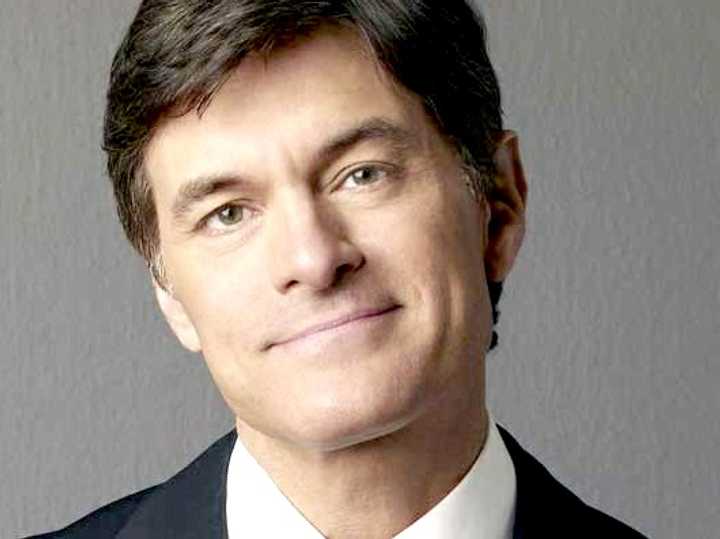The Appellate Division upheld a Superior Court judge’s ruling in Hackensack that Angelo R. Bisceglie Jr. should have gone to Cliffside Park’s zoning board in his beef with Mehmet Oz, his wife, Lisa, and local officials.
The celebrity TV heart surgeon (above) and his wife originally planted a row of bamboo trees after receiving approval from the borough Zoning Board of Adjustment for a 6,000-square-foot extension onto their house that included an in-ground pool and cabana.
After Bisceglie complained that the trees were flammable and whacking his house in high winds, the Ozes replaced them with a trio of 40-foot cedar pines.
Bisceglie, in turn, went to court. He also wrote a letter to Mayor Gerald Calabrese, the municipal planner and other local officials, telling them that he was left with a “completely obstructed” view of the river and the city skyline that devalued his Edgewater Road home atop the Palisades by as much as a half-million dollars.
The trees technically are “fences” under local statutes, the former assistant prosecutor contended, adding that the Ozes never applied for or received a variance from the borough to plant them (Cliffside Park’s statutes limit fences to four feet).
Superior Court Judge Menelaos W. Toskos dismissed the complaint, finding that Bisceglie “failed to exhaust administrative remedies.” The matter needed to be heard by either the planning or zoning board, the judge said.
Superior Court Judge Menelaos Toskos (CLIFFVIEW PILOT photo by Mary K. Miraglia)
Bisceglie responded by taking his case to the state Appellate Division, arguing that Toskos should have heard the case.
The appeals judges disagreed, saying that their Superior Court counterpart – in a “cogent and well-reasoned” ruling – made the right call.
The judges pointed to a 1975 opinion involving New Milford: “[T]he exhaustion of remedies requirement is a rule of practice designed to allow administrative bodies to perform their statutory functions in an orderly manner without preliminary interference from the courts.”
But there’s more.
Plaintiffs have 20 days to bring such appeals, a time limit that protects people from “the threat of unrestrained future challenges” and “direct and collateral attacks” on their rights, the appeals judges wrote.
That doesn’t mean you can’t go to court in such instances – as long as you first go the administrative route, the judges emphasized.
A judge can intervene when the “interest of justice” must be preserved. But the appeals panel said that should only be in “special circumstances” when there is a clear “abuse of discretion” – which it said doesn’t apply in Oz’s case.
In those cases in which it does, a judge must find that “administrative review will be futile,” that there is a “need for prompt decision in the public interest,” or that “irreparable harm will otherwise result from denial of immediate judicial relief.”
Although trees fall within the legal definition of a fence under the municipal ordinance, it doesn’t “render a row of trees a ‘fence’ in every case,” the appeals judges wrote. That becomes “a case by case determination, involving a more fact intensive review” of size, positioning, use, placement, purpose and other factors, they found.
In any event, the higher court emphasized, “a party cannot bypass the twenty-day time restraint … by cloaking the request as an interpretation of law.”
Admitted to the New Jersey, New York and Pennsylvania bars 25 years ago, Biceglie, a former assistant prosecutor in Morris and Essex counties, specializes in the construction industry and education law, as well as employment and labor law. He has negotiated numerous private and public sector collective bargaining agreements and, by his count, has participated in several hundred labor arbitrations and hearings – representing more than 34,000 union construction workers throughout the U.S.
He was special labor counsel to Gov. Jim Florio, was appointed by Gov. Thomas Kean as a state mediator and has served as special counsel to, among others, the New Jersey Casino Control Commission, the South Jersey Transportation Authority and several school districts.
Oz, a staff cardiothoracic surgeon at New York Columbia Presbyterian Hospital, hosts a popular TV medical talk show.
Bisceglie was given a copy of the original landscaping plan in August 2010, the appeals court wrote in its decision, issued Monday. The plan called for five trees instead of the three that resulted.
On Nov. 16, nearly three months after receiving that plan, Bisceglie filed suit, the ruling says.
If he’d originally taken his complaint to the zoning board and been denied, Bisceglie could have gone to court, the appeals panel wrote. A judge then would have had “the benefit of reviewing the determination with a developed factual record produced at the local level[,] as well as a written explanation produced by individuals familiar with the municipality and its land use policies.”
Oz later moved the trees to the other end of his property, away from Bisceglie’s, “in an apparent attempt to accommodate [his] objection,” the appeals judges noted in their decision. But Bisceglie said he was still denied a full view.
Click here to follow Daily Voice Hackensack and receive free news updates.

